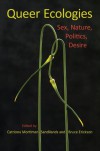3
Followers
14
Following
Simcha-Sophie
a lovely mishmash of opinions interspersed with moments of clarity and vision by a vegan lesbian feminist mystery-loving, history-loving reader and writer.
Currently reading
The More I Owe You: A Novel
The Lifelong Activist: How to Change the World without Losing Your Way
Queer Ecologies: Sex, Nature, Politics, Desire
Odd Girls and Twilight Lovers: A History of Lesbian Life in Twentieth-Century America (Between Men--Between Women)
The Healing Earth
Revolt and Crisis in Greece: Between a Present Yet to Pass and a Future Still to Come
Tipping the Velvet: A Novel
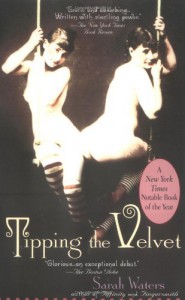 Once again I look at the Visual Bookshelf rating and don't understand the 84%. This is absolutely one of the best books I've read all year, if not the best (then again, considering what I've read that might not be so much of a compliment).
Once again I look at the Visual Bookshelf rating and don't understand the 84%. This is absolutely one of the best books I've read all year, if not the best (then again, considering what I've read that might not be so much of a compliment).I have a few gripes with it, the main one being the overuse of the verb "gave" where it seems unnecessary. She gave a sigh, I gave a smile, I gave a shake, etc. when of course the second verb alone would have sufficed. I admit to not knowing so much about Victorian literature and it's possible this kind of writing was done a lot then, and that Waters emulates that.
My other gripe soon dissipated but had to do with Nancy's profession after Kitty (I won't give away more than that).
Nancy is flawed but likable, as most of the characters are. The foreshadowing works extremely well and though this is not a suspense novel as one normally thinks of suspense, it is a page-turner; you just *have* to know what's going to happen. The setting - the theater scene, the impoverished parts of London, the lesbian salons and patronizing of wealthy lesbians all make the story come alive and make one realize that social class and status have more to do with a person's attitude than does sexual identity. The fact that Nancy is androgynous and dresses in men's clothes, well, that never goes amiss with me! ;)
The happy ending? Well, perhaps a little contrived, but then so many lesbian novels have a history of unhappy endings, and it is fiction. I'm a sucker for happy endings anyway. There aren't enough in real life. I highly recommend this book!
Hitler's Scientists: Science, War, and the Devil's Pact
 This was boring as shit. That's about all I have to say. It took me two years to read it. But I was turned off it early on for the author's take on Hitler's alleged vegetarianism. I have seen it said Hitler was a veg, and I have also seen it that he ate pheasant. Therefore, he was not a vegetarian. Regardless of whether he was, the author presents Hitler as an ignoramus who thought he knew all about science but did not -- and this does not seem farfetched to me -- but the section at the beginning where Cornwell is sort of listing Hitler's foibles, "proving," so to speak, his instability or lack of grasp on reality, includes vegetarianism. As if vegetarianism is some bizarre behavior of people who have little grip on reality.
This was boring as shit. That's about all I have to say. It took me two years to read it. But I was turned off it early on for the author's take on Hitler's alleged vegetarianism. I have seen it said Hitler was a veg, and I have also seen it that he ate pheasant. Therefore, he was not a vegetarian. Regardless of whether he was, the author presents Hitler as an ignoramus who thought he knew all about science but did not -- and this does not seem farfetched to me -- but the section at the beginning where Cornwell is sort of listing Hitler's foibles, "proving," so to speak, his instability or lack of grasp on reality, includes vegetarianism. As if vegetarianism is some bizarre behavior of people who have little grip on reality.I take exception to this because, of course, it's not true. Vegetarians have more of a grip on reality than omnivores. Also, that it's most likely untrue that Hitler was a vegetarian (he banned all German vegetarian groups when he took office) makes me doubt the research/validity of the rest of Cromwell's book. How can you trust an author who most likely gets this simple fact wrong? So that did not dispose me kindly toward whatever else Cornwell wrote.
And it was boring. I mean, really really boring.
Secret Society Girl: An Ivy League Novel
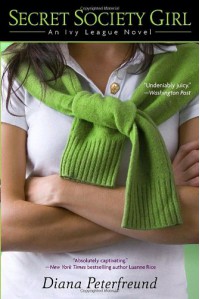 This is readable and enjoyable in the sense that a Lifetime movie is enjoyable. You wonder why you're sitting there with it, and yet something about it compels you. Probably helps that I was needing a huge distraction in my life at the time.
This is readable and enjoyable in the sense that a Lifetime movie is enjoyable. You wonder why you're sitting there with it, and yet something about it compels you. Probably helps that I was needing a huge distraction in my life at the time.Although it's likely any real secret society would not allow a book to be written about it, the way this one is pulled off is rather ridiculous. I won't go into specifics here, but while the premise is interesting the way it's pulled off is like, ugh, dare I say it, "chick lit," next to Christian fiction probably my least-favorite genre. Oh, besides westerns. The ending comes off like some kind of John Hughes movies, and my goodness, authors, when you want to model a character after yourself, you can at least give her a different haircut from the one you have in your author photo (I know about this stuff because I have a bad tendency to write many characters who resemble myself as well.) Particularly irritating: the lesbian character who has "a thing for John McCain."
Ugh.
Confessions of a Prairie Bitch: How I Survived Nellie Oleson and Learned to Love Being Hated
 Before I get to the good stuff, there are a few annoyances with this book. First is Arngrim's tendency to use quotations for things said decades ago when the syntax is very 2010's ("You so did not," for example). I understand that it's hard to remember exactly what was quoted 30+ years ago, but at least make an effort to have it sound much more 1970s. Second is her intense dislike for Melissa Sue Anderson. Now I'm not saying I don't enjoy gossip like this. To my discredit, I do. But at the end Arngrim suggests that maybe after all they can get together, be adults, try to come to terms with their past -- after she's spent a good deal of time trashing her in the book. Of course I have no idea what's true and what's not. I guess the biggest disappointment in the book is the lack of Little House stories themselves. Yeah, Arngrim has had an interesting (and devastating at times) life; but honestly I want to know more about the filming and the interactions among the co-stars. There was hardly anything about Karen Grassle, either. Disappointing.
Before I get to the good stuff, there are a few annoyances with this book. First is Arngrim's tendency to use quotations for things said decades ago when the syntax is very 2010's ("You so did not," for example). I understand that it's hard to remember exactly what was quoted 30+ years ago, but at least make an effort to have it sound much more 1970s. Second is her intense dislike for Melissa Sue Anderson. Now I'm not saying I don't enjoy gossip like this. To my discredit, I do. But at the end Arngrim suggests that maybe after all they can get together, be adults, try to come to terms with their past -- after she's spent a good deal of time trashing her in the book. Of course I have no idea what's true and what's not. I guess the biggest disappointment in the book is the lack of Little House stories themselves. Yeah, Arngrim has had an interesting (and devastating at times) life; but honestly I want to know more about the filming and the interactions among the co-stars. There was hardly anything about Karen Grassle, either. Disappointing. However, the book is written with a lot of humor, and is often extremely amusing. It's easy to get through. It's horrifying to read about her childhood, but it's impressive to see that she's not someone who uses her former (?) fame to do nothing more than complain about being typecast (Eve Plumb comes to mind).
A great distracting read for anyone who's grown up on Little House.
Island of Lost Girls: A Novel
 This is a very readable book - that's one thing in its favor. There is an aura of creepiness about it, but all too soon it veers off into Lifetime Movie territory, and has far too much similarity to McMahon's first book, which I read a couple years ago. I don't find the characters particularly likable, and I am really offended by (spoilers coming up; if you plan to read this book do not read the rest of this review) -- offended by the ease with which Lizzy returns for the purpose of forgiving her dead father.
This is a very readable book - that's one thing in its favor. There is an aura of creepiness about it, but all too soon it veers off into Lifetime Movie territory, and has far too much similarity to McMahon's first book, which I read a couple years ago. I don't find the characters particularly likable, and I am really offended by (spoilers coming up; if you plan to read this book do not read the rest of this review) -- offended by the ease with which Lizzy returns for the purpose of forgiving her dead father. The denouement is anticlimactic; the characters, except for the young Lizzy, are for the most part unsympathetic, particularly Tock. Bleh. A disappointment. I gave it three stars because it was, for the first 2/3, immensely readable.
Babies, Bikes and Broads: The third book in the Cat Rising series
 Oh dear. This is tricky because the author is a friend of a friend. Let me start by saying that despite my overall dislike of the book, something about it kept me reading.
Oh dear. This is tricky because the author is a friend of a friend. Let me start by saying that despite my overall dislike of the book, something about it kept me reading.This is the story of Cat, who returns home to Galway, NC, from Scotland to help her widower brother take care of his two kids. What she doesn't count on is her high-school crush and summer romance, Janey, also returning (from NJ). Cat harbors a grudge (20 years later) for Janey's having left her for grad school and marrying a man.
The writing is decent, but Chadwick has a habit of italicizing a lot of phrases and words to a point where it becomes distracting. There are also some editorial issues, like the two spellings of Mama - Mamma and Mama - especially toward the end of the book.
The story is really quite simple and formulaic and it would be enjoyable if the characters were not so brusque and/or contantly quoting platitudes. And the niece and nephew are obnoxious.
Most of my problem with the book, I think, comes from my political perspective. For starters, Galway must be some kind of lesbian haven to the point where it's in the south and relatively rural (or so it seems) and everyone's all accepting of everyone else. And apparently, Cat, who is around my age (41) was sleeping around with a lot of girls in high school. I wondered if she went to freaking Harvey Milk in NYC because even in relatively liberal NJ, back in the 1980s it was *not* cool to be a lesbian. Almost all the lesbians in the book are "beautiful" (as if there is only one kind of beautiful) and femme. There are fur coats, rabbits-feet good luck charms and a hunter who needs to be consulted about a Mama bear.
I think this book is actually a fantasy that attempts to populate an alternate United States with lesbians who just fit into the mainstream and it's all okay. This irritates me because while this book is fiction, it doesn't represent any kind of reality I'm aware of, and I do find it troubling that too many people regard the ability to have chilrend, whether through in vitro fertilization or adoption, and marraige, to be the pinnacle of what will constitute some kind of equality - as if being equal within a system of oppression is a good thing.
Basically this is fantasy of what some of us think life should be like for lesbians. But this vegan left-wing political dyke disagrees and is quite irritated by it. Too bad.
The Devil's Door (Catherine LeVendeur Series #2)
 The second installment in this series is a solid good. The characters are so likeable and believable, and Newman does a good job of bringing that world to life. However, the conflicts with Peter Abelard and Heloise go on a bit too long and slow the story down. It's not as interesting as the first one, but good enough to send me after the third book.
The second installment in this series is a solid good. The characters are so likeable and believable, and Newman does a good job of bringing that world to life. However, the conflicts with Peter Abelard and Heloise go on a bit too long and slow the story down. It's not as interesting as the first one, but good enough to send me after the third book.
The Mermaid's Madness (PRINCESS NOVELS)
 Yuck. Hines is still a master with setting, but the characters have become sort of cookie cutter - one is responsible, one's flirty, one's angry. It's getting old. Prince Armand, who we meet here for the first time, is a pompous jerk. I have no idea what Cinderella sees in him. More irritating still is Danielle's (aka Cinderella's) ability to communicate with animals - sea birds, sharks, crabs, kelpies - and in the process these creatures, who do her bidding, are routinely slaughtered in warfare and she thinks nothing of it. Who treats their friends like that? It's unsettling and inconsistent with who the character is supposed to be based on her other qualities - ability to listen, her thanking the birds for their help, her concern for one of her human friends. Again, I will reiterate that Hines is excellent with setting, from the sea to the castles; his ability to create names that seem fitting for, say, a race of mermaids is outstanding. But the only reason I did not throw this book into a recycling bin is because I appreciate the lesbian storyline woven in - though I still have some issues with the stereotyping involved there.
Yuck. Hines is still a master with setting, but the characters have become sort of cookie cutter - one is responsible, one's flirty, one's angry. It's getting old. Prince Armand, who we meet here for the first time, is a pompous jerk. I have no idea what Cinderella sees in him. More irritating still is Danielle's (aka Cinderella's) ability to communicate with animals - sea birds, sharks, crabs, kelpies - and in the process these creatures, who do her bidding, are routinely slaughtered in warfare and she thinks nothing of it. Who treats their friends like that? It's unsettling and inconsistent with who the character is supposed to be based on her other qualities - ability to listen, her thanking the birds for their help, her concern for one of her human friends. Again, I will reiterate that Hines is excellent with setting, from the sea to the castles; his ability to create names that seem fitting for, say, a race of mermaids is outstanding. But the only reason I did not throw this book into a recycling bin is because I appreciate the lesbian storyline woven in - though I still have some issues with the stereotyping involved there.
The Stepsister Scheme (PRINCESS NOVELS)
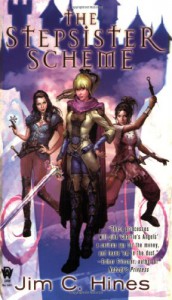 I started out hating this - the idea that to be strong women have to be fighters (in the vein of patriarchy), that the one princess with an attitude has a darker complexion than the others, that the Cinderella - Danielle- can't distinguish between animals who help her and those she kills to wear and eat. However, the book grew on me. I think it had to do with setting more than anything else. I'm impressed by how natural this fantasy world seems, how Hines mixes imagination with just enough recognizabledetails that this world and Fairytown seem fully anchored in (a) reality. The characters also grew on me; they are more than stereotypes, which is refreshing. (And not to spoil things or anything, but I detect some lesbianism so let's hope Hines keeps it up and consistent. If she turns out to be pansexual I'll be very disappointed.) For the most part I enjoyed the humor. But the setting is particulary strong, and as someone who reads fantasy very sporadically because I have trouble suspending belief in a lot of these fantastic worlds, that's a high compliment.
I started out hating this - the idea that to be strong women have to be fighters (in the vein of patriarchy), that the one princess with an attitude has a darker complexion than the others, that the Cinderella - Danielle- can't distinguish between animals who help her and those she kills to wear and eat. However, the book grew on me. I think it had to do with setting more than anything else. I'm impressed by how natural this fantasy world seems, how Hines mixes imagination with just enough recognizabledetails that this world and Fairytown seem fully anchored in (a) reality. The characters also grew on me; they are more than stereotypes, which is refreshing. (And not to spoil things or anything, but I detect some lesbianism so let's hope Hines keeps it up and consistent. If she turns out to be pansexual I'll be very disappointed.) For the most part I enjoyed the humor. But the setting is particulary strong, and as someone who reads fantasy very sporadically because I have trouble suspending belief in a lot of these fantastic worlds, that's a high compliment. ( think the cover art is crappy but that's not the author's fault.
My Sister's Bones
 On the one hand, this was pretty readable so there must have been something redeeming about it. On the other hand I felt a bit lost. The book is about the sister of an anorexic girl in the NJ suburbs and her junior year in high school, what happens, how her family deals with the anorexia (not well) - but the first thing to throw me is the setting. At first I assumed it takes place around the copyright, sometime in the late 1990s. It's not until we're at least halfway into the book that it's apparent it's most likely the 70s, though maybe 8-track tapes were big in the early 80s. The characterizations are okay, but without a whole lot of depth, and the Weinstein family, except for Cassie, is pretty much unlikeable. It's hard to be more specific at this point; the book seems to head off in one direction and never quite gets there, the ending is guessable but still leaves the reader hanging. Just a very unsatisfying story.
On the one hand, this was pretty readable so there must have been something redeeming about it. On the other hand I felt a bit lost. The book is about the sister of an anorexic girl in the NJ suburbs and her junior year in high school, what happens, how her family deals with the anorexia (not well) - but the first thing to throw me is the setting. At first I assumed it takes place around the copyright, sometime in the late 1990s. It's not until we're at least halfway into the book that it's apparent it's most likely the 70s, though maybe 8-track tapes were big in the early 80s. The characterizations are okay, but without a whole lot of depth, and the Weinstein family, except for Cassie, is pretty much unlikeable. It's hard to be more specific at this point; the book seems to head off in one direction and never quite gets there, the ending is guessable but still leaves the reader hanging. Just a very unsatisfying story.
Rena's Promise: A Story of Sisters in Auschwitz
 Probably one of the best Holocaust memoirs I've ever read, and an inspiration. The author and her sister were among the earliest prisoners of Auschwitz, and despite the number years they spent there enduring selections and hunger and disease they still survived. The writing is eloquent and visual.
Probably one of the best Holocaust memoirs I've ever read, and an inspiration. The author and her sister were among the earliest prisoners of Auschwitz, and despite the number years they spent there enduring selections and hunger and disease they still survived. The writing is eloquent and visual.
The Sexual Politics of Meat: A Feminist-Vegetarian Critical Theory
 Parts of this book shine, and Adams really hits the nail on the head when she explains why veg*ns can get so offended by omnivores who call themselves vegetarians. However, I think the title is misleading. Adams starts out with much promise, showing the links between advertising meat and women for consumption, but quickly falls into literary critiques and leaves a lot of the politics and sociology behind.
Parts of this book shine, and Adams really hits the nail on the head when she explains why veg*ns can get so offended by omnivores who call themselves vegetarians. However, I think the title is misleading. Adams starts out with much promise, showing the links between advertising meat and women for consumption, but quickly falls into literary critiques and leaves a lot of the politics and sociology behind.This book is much better suited to viewing literature, rather than life, from a feminist and vegetarian standpoint. I only wanted more linking and connection not related to literature, because I am certain Adams is onto something here and it doesn't have to do with literature.
Lesbian Pulp Fiction: The Sexually Intrepid World of Lesbian Paperback Novels 1950-1965
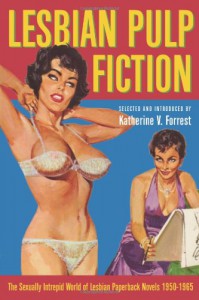 What a great overview! I read Odd Girl Out in its entirety a few years ago and was pretty disappointed - not much of what I'd hoped for from a pulp: good setting/feel for the time period and lots of sex; it is really pretty formulaic. So this overview was a nice surprise.
What a great overview! I read Odd Girl Out in its entirety a few years ago and was pretty disappointed - not much of what I'd hoped for from a pulp: good setting/feel for the time period and lots of sex; it is really pretty formulaic. So this overview was a nice surprise.Some of the selections in this book are pretty bad,but most are not. They're often interesting explorations of women coming to terms with their sexuality in mid-20th century America and some have a really fantastic sense of place and time. (Okay, yeah, the sex scenes are pretty fun too!)
The bibliography and list of other lesbian-related literature is also helpful for adding to one's book list.
Gone to Soldiers
 I have to rewrite my review. I haven't read this book in 20 years, and started re-reading it early this month. My how things change.
I have to rewrite my review. I haven't read this book in 20 years, and started re-reading it early this month. My how things change. While I like Piercy's writing and her characterizations and setting are very strong, I was totally blown away by the fact that just about every single character -- and there are many characters in this novel -- is involved with some kind of animal exploitation. This is probably not something a non-vegan would notice, and I recognize that animal exploitation has historically been the norm so some depictions of it, and much ignorance around it, is to be expected. Yet it is difficult to read and care about characters who laugh at chickens dying, where one woman works at a furrier, where another character has hunted, another has slaughtered animals without being squeamish -- and on and on. One or two of these things, sure, I understand -- that's how things were and realistically that cannot be helped-- but this is totally beyond anything I've read before. I mean, it is fiction. Stick someone in a bookshop instead of a furrier's. Make the family business something like tailoring. But for every character to exploit animals beyond eating them is just too distracting and upsetting for me to continue. Particularly when Piercy is trying to write about the horrors of war.
In the end I knew I would end up loathing just about every character in this 740+ -page work, so I stopped reading it. This book has gone from my favorite novel to seriously disappointing piece of shit.
The Best Democracy Money Can Buy
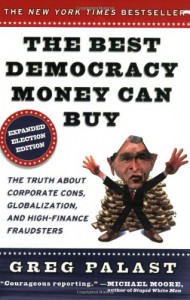 He trashes the right, he trashes the liberals -- and all with a sense of humor and documented facts. Eye opening, depressing and funny.
He trashes the right, he trashes the liberals -- and all with a sense of humor and documented facts. Eye opening, depressing and funny.Because what you think you know you realize is either just the tip of the iceberg, or just plain wrong.
I Am Not a Psychic!: A Novel
 This was disappointing. I wasn't expecting great literature or anything, but it was a bit overindulgent and a lot of that Belzer wit actually felt kind of nasty. I especially was annoyed with the makeover bit. You'll understand if you read the book -- don't want to write a spoiler here. Would I recommend it? Well, if you like Belzer and a light read, and not a lot of required thinking you probably would. If you tend to be a feminist you might prefer to skip it.
This was disappointing. I wasn't expecting great literature or anything, but it was a bit overindulgent and a lot of that Belzer wit actually felt kind of nasty. I especially was annoyed with the makeover bit. You'll understand if you read the book -- don't want to write a spoiler here. Would I recommend it? Well, if you like Belzer and a light read, and not a lot of required thinking you probably would. If you tend to be a feminist you might prefer to skip it.


